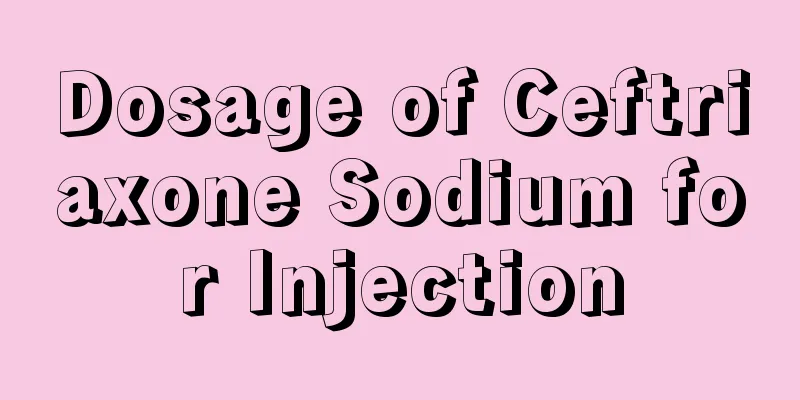Dosage of Ceftriaxone Sodium for Injection

|
Ceftriaxone Sodium for Injection is an antibiotic drug that is mainly used to treat some infectious diseases. Like other western medicines, cefotaxime sodium for injection can cause allergic reactions, so an allergy test should be done before using the medicine to prevent allergic reactions, which may even threaten life. Ceftriaxone sodium for injection is generally suitable for adults. Intramuscular injection is not allowed in infants and young children, and the elderly should reduce the amount of drug injection appropriately. Having said so much, are you curious about how to use ceftriaxone sodium for injection? Let’s follow me to learn more about it in detail! 1. Category Chemicals and Biological Products>>Antimicrobial Drugs>>Antibacterial Drugs>>Antibiotics (II) Characteristics This product is white to pale yellowish white crystalline powder. 3. Indications It is suitable for pneumonia and other lower respiratory tract infections, urinary tract infections, meningitis, sepsis, abdominal infections, pelvic infections, skin and soft tissue infections, reproductive tract infections, bone and joint infections, etc. caused by sensitive bacteria. Ceftriaxone can be used as an alternative drug for children with meningitis. (IV) Usage and Dosage Adults: 2-6 g per day, divided into 2-3 times for intravenous injection or intravenous drip; for patients with severe infection, 2-3 g every 6-8 hours, and the maximum daily dose shall not exceed 12 g. For the treatment of uncomplicated pneumococcal pneumonia or acute urinary tract infection, 1 g every 12 hours. For newborns aged 7 days or less, take 50 mg/kg every 12 hours; for newborns aged 7 days or more, take 50 mg/kg every 8 hours. For patients with meningitis, the dose can be increased to 75 mg/kg every 6 hours, all administered intravenously. Patients with severe renal impairment should reduce the dosage of this product appropriately. When the serum creatinine value exceeds 424μmol/L (4.8mg) or the creatinine clearance rate is lower than 20ml/min, the maintenance dose of this product should be halved; when the serum creatinine exceeds 751μmol/L (8.5mg), the maintenance dose is 1/4 of the normal amount. For patients who need hemodialysis, take 0.5 to 2 g per day. However, an additional dose should be given after dialysis. (V) Adverse Reactions The incidence of adverse reactions is low, about 3% to 5%. (1) Skin rash, drug fever, phlebitis, diarrhea, nausea, vomiting, loss of appetite, etc. (2) Mild increase in alkaline phosphatase or serum aminotransferase, temporary increase in blood urea nitrogen and creatinine, etc. (3) Leukopenia, leukocytosis, or thrombocytopenia are rare. (4) Headache, numbness, dyspnea and facial flushing may occur occasionally. (5) A very small number of patients may develop mucosal candidiasis. |
<<: Indications of Cyclic Adenosine Glucoamine for Injection
>>: Who can't eat chrysanthemum
Recommend
How to effectively remove mildew stains from clothes
In spring, it rains all the time and the weather ...
What are the symptoms of hepatitis B virus (HBsAg)? Divided into three stages
Big triple positive is different from small tripl...
How to eat buckwheat kernels deliciously
Coarse grains are very common in people's liv...
Grapefruit passion fruit tea
Grapefruit and passion fruit are both recognized ...
Can armpit hair be trimmed
For girls who love beauty, it would be wonderful ...
What's the matter with the eyebrow bone pain and how to relieve it
Brow bone pain is relatively rare for many people...
What is the correct way to use nose patches?
According to a survey, Asian skin is most prone t...
What is the cause of neck allergy
Everyone has a different physical constitution, s...
What to do if you often have palpitations
There are actually many reasons for palpitations....
How often should you wash your face with salt water
There are certain rules to follow when washing yo...
How to treat facial crookedness caused by tooth misalignment?
The teeth generally need to be aligned to maintai...
What are the indications for lung puncture
Lung puncture is a common examination method, tha...
The difference between bivalent, quadrivalent and nonavalent cervical cancer vaccines
Cervical cancer vaccines are divided into bivalen...
Tips for preventing and treating dry lips in autumn
Lack of water is the main cause of lip lines and ...
After early gastric cancer surgery, multiple recurrences occurred within 10 years. Doctors: The key to preventing recurrence lies in 4 points
Gastric cancer is no longer a terminal illness, a...









